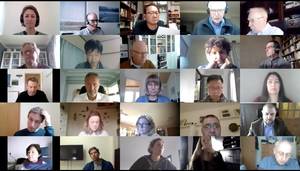Stay in the loop! Subscribe to our mailing list
When the first confirmed cases of COVID-19 were discovered in Iceland at the end of February and authorities started hinting at restrictions on public gatherings, it became clear to the organisers of the ![]() Arctic Science Summit Week 2020 (ASSW) that their conference, planned to take place in less than a month, would have to take a different shape if it were to happen at all. After having made the formal decision to go online, swift reactions were needed to ensure the quality and success of the event. Following this steep learning curve, the organisers decided to collect the lessons learned in a report with a view to give practical advice to event organisers around the world who also face the need to rethink the format of public gatherings.
Arctic Science Summit Week 2020 (ASSW) that their conference, planned to take place in less than a month, would have to take a different shape if it were to happen at all. After having made the formal decision to go online, swift reactions were needed to ensure the quality and success of the event. Following this steep learning curve, the organisers decided to collect the lessons learned in a report with a view to give practical advice to event organisers around the world who also face the need to rethink the format of public gatherings.
Arctic Science Summit Week is an annual conference for Arctic researchers and research organisations, hosted by the ACA member Rannís, the University of Akureyri and the International Arctic Science Committee (IASC). Planned to take place in Akureyri (Iceland), the conference was moved to Zoom and held on the dates originally foreseen: 27 March – 2 April 2020. 650 researchers from 28 countries joined more than 75 Zoom sessions during the event, including 10 panel discussions, five keynotes and two poster sessions.

(IASC Council Meeting during ASSW2020 Online)
The report outlines several practices that worked well according to the first-hand experience of the organisers as well as feedback from participants. This includes providing clear and comprehensive information to participants; organising sessions that fit to different time zones; and sharing presentation material beforehand to ensure enough time online for discussions. The attendees welcome the alternative for those who cannot travel as well as the cost savings and the reduced carbon emissions resulting from going online. An online format cannot fully replace an in-person meeting – as it is makes it more difficult to network and interact dynamically – but can however provide a vital platform for continued research collaboration across borders, especially under the circumstances caused by COVID-19.
The report is available ![]() here.
here.